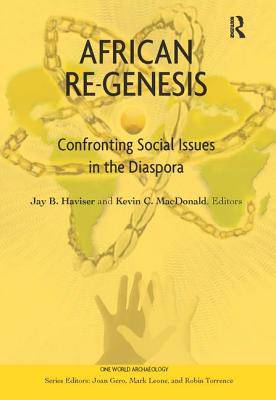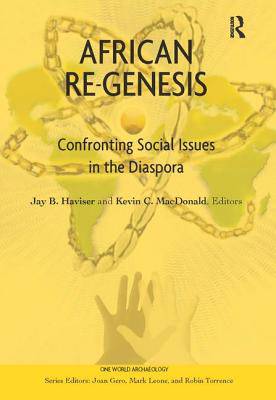
- Afhalen na 1 uur in een winkel met voorraad
- Gratis thuislevering in België vanaf € 30
- Ruim aanbod met 7 miljoen producten
- Afhalen na 1 uur in een winkel met voorraad
- Gratis thuislevering in België vanaf € 30
- Ruim aanbod met 7 miljoen producten
African Re-Genesis
Confronting Social Issues in the Diaspora
€ 54,45
+ 108 punten
Omschrijving
Ripped from motherland and family, ethnically mixed to quell the potential of uprisings, and brutalized by regimes of hard labor, the heart - the spirit - of Africa did not stop beating in the New World. Rather, it survived and has re-emerged; changed by contacts with new cultures and environments, but still part of the continuum of African tradition: an African Re-Genesis. This is the first volume in its field to emphasize the interdisciplinary temporal and geographic comparative research of Archaeology, Anthropology, History and Linguistics to allow us to form unique perspectives on broader trends in the transformation and (re-) emergence of African Diaspora cultures. African Re-Genesis confirms that regardless of discipline, from continental Africa to Europe, the Western Hemisphere and Indian Ocean, all Diaspora research requires a relevance to modern communities and sensitivity to the interplay with contemporary cultural identities. Matters concerning race and cultural diversity, though ostensibly de-fused by the vocabulary of political correctness, remain contentious. Indeed, the topic of racial relations has become to the twenty-first century what sex was to the nineteenth century - something best not discussed in public, and better talked around than confronted directly. African Re-Genesis strikes at the nerve of urgency that the past, present and future globalization of African cultures, is a cornerstone of the entire human experience, and it thus deserves recognition as such.
Specificaties
Betrokkenen
- Uitgeverij:
Inhoud
- Aantal bladzijden:
- 290
- Taal:
- Engels
- Reeks:
Eigenschappen
- Productcode (EAN):
- 9781598742831
- Verschijningsdatum:
- 1/12/2006
- Uitvoering:
- Paperback
- Formaat:
- Trade paperback (VS)
- Afmetingen:
- 155 mm x 231 mm
- Gewicht:
- 498 g

Alleen bij Standaard Boekhandel
+ 108 punten op je klantenkaart van Standaard Boekhandel
Beoordelingen
We publiceren alleen reviews die voldoen aan de voorwaarden voor reviews. Bekijk onze voorwaarden voor reviews.









